| Srl | Item |
| 1 |
ID:
114164
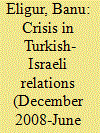

|
|
|
|
|
| Publication |
2012.
|
| Summary/Abstract |
Turkey and Israel had been strategic partners since the 1990s. Yet, there has been an unprecedented crisis between the two countries particularly since the winter of 2009. This article analyses the stalemate in bilateral relations, and argues that the Justice and Development Party's (Adalet ve Kalkinma Partisi, AKP) Islamist foreign policy toward the Middle East and the 2003 Iraqi war ended the sources of strategic partnership between Turkey and Israel.
|
|
|
|
|
|
|
|
|
|
|
|
|
|
|
|
| 2 |
ID:
114159
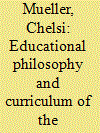

|
|
|
|
|
| Publication |
2012.
|
| Summary/Abstract |
The educational curriculum produced by the Fatah-led Palestinian Authority (PA) is said to be situated on the intellectual basis of faith in Allah. The curriculum presents Islam as one of three essential components of the Palestinian identity. The place given to Islam in the educational philosophy and curriculum of the PA signifies a departure from the place given to Islam in the PLO's earlier documents and Fatah's earlier discourse; in fact, owing to the elevated position of Islam, the discourse in the curriculum more closely resembles that of the PLO's Islamist opposition, namely Hamas. This article compares the Palestinian identity discourse as it is presented in the PA educational philosophy (1998) and school curriculum (2000-2006) with the identity discourse in the PLO's earlier philosophy of education as well as Hamas' philosophy of education. The explanation for this change in the discourse of the Palestinian nationalist movement takes into account Fatah's bid to maintain legitimacy in a deeply divided society and Hamas' challenge to Fatah in the Palestinian arena as well as the background of the Islamic revival across the greater Muslim world.
|
|
|
|
|
|
|
|
|
|
|
|
|
|
|
|
| 3 |
ID:
114163
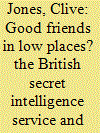

|
|
|
|
|
| Publication |
2012.
|
| Summary/Abstract |
This article explores intelligence collaboration between British Intelligence and the Jewish Agency during the Second World War. Most accounts of this period highlight the functional nature of this collaboration, accounts that inevitably have come to be viewed through the prism of the Holocaust, and with it the prevailing sense that Britain offered 'too little too late to help' in using its clandestine assets to help rescue the remnants of European Jewry. By focusing however on collaboration primarily between the British Secret Intelligence Service (MI6) and the Jewish Agency, this article argues that intelligence liaison and collaboration at an operational level was closer and less conditioned by adherence to stated British government policy than hitherto suggested.
|
|
|
|
|
|
|
|
|
|
|
|
|
|
|
|
| 4 |
ID:
114162
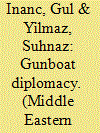

|
|
|
|
|
| Publication |
2012.
|
| Summary/Abstract |
This article aims to re-evaluate the visit of the battleship USS Missouri to Turkey on 5-6 April 1946, to ascertain whether or not it might be considered an early attempt on the part of the United States to challenge the Soviet Union. Greater historical clarity than previously possible has been achieved through the use of hitherto unreleased documents from the archives of the Ministry of Foreign Affairs of the Turkish Republic. Moreover, this article aims to achieve a more balanced and comprehensive analysis by integrating the systemic factors with the actions of crucial actors at the individual level based on new archival evidence. By doing this, the main argument emerges whereby the United States displayed its power against the Soviets via the visit of the USS Missouri only in hindsight; while the decision to send home the exhumed body of the late Turkish ambassador Mehmet Münir Ertegün was the action of an individual. However, due to the advent of the Cold War, the dynamics shaping Turkey's search for security and ultimately the containment policy of the United States, has loaded the event with more meaning than was originally intended, turning a 'diplomatic courtesy' into 'gunboat diplomacy'.
|
|
|
|
|
|
|
|
|
|
|
|
|
|
|
|
| 5 |
ID:
114160


|
|
|
|
|
| Publication |
2012.
|
| Summary/Abstract |
This article explains the employment practices at Turkish state factories during the 1930s and 1940s when the state expanded industrial activity. Complaints about the availability of industrial workers had been commonplace since the population exchange, but emerged as a key constraint on industrial activity in the 1930s and 1940s, as industrial production expanded considerably. The article argues that the Turkish state introduced social services in Turkish state factories in response to workers' resistance to the low wages and long hours of work. Rather than a deliberate attempt at populism or building political support, the expansion of social amenities through state economic enterprises reflected the weakness of the state in enforcing industrial discipline and the limitations of creating industrial labour forces through compulsion.
|
|
|
|
|
|
|
|
|
|
|
|
|
|
|
|
| 6 |
ID:
114158
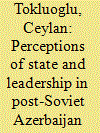

|
|
|
|
|
| Publication |
2012.
|
| Summary/Abstract |
The focus of this paper is the shifting perceptions of the state, leadership and politics, and the shifting perceptions of Azerbaijanis themselves and the outside world. The information presented in this article is based on personal interviews conducted with leading and influential members of the Azerbaijani political elite in Baku in August 1998 and April 2009. Attitudes and norms concerning the state, leadership and politics emanate from three sources: the legacy of the pre-Soviet (Turkish) period, the Soviet period, and the circulation of western democratic values and norms. This reflects the impact of historical and cultural forces that have shaped the lives of the political elites and are manifested in their understanding of contemporary governance. A powerful state and a strong leader mutually reinforce each other where the leader is perceived as responsible for the well-being of its citizens. In this context, the article examines the conflicting narratives of the government and the opposition in Azerbaijan while reconstructing their national past and building their future, where their past becomes an important source for the mentality of governance in the country.
|
|
|
|
|
|
|
|
|
|
|
|
|
|
|
|
| 7 |
ID:
114161
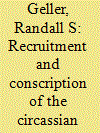

|
|
|
|
|
| Publication |
2012.
|
| Summary/Abstract |
This article examines the process leading to the draft of the Sunni Muslim Circassian community into the Israel Defence Forces beginning in 1958. While the Circassians were the second and final minority group to be drafted into the IDF (following the Druze in 1956), the background to and implementation of the draft of this community in Israel has been virtually ignored by previous researchers. This article is the first to examine the process leading to the Circassian draft based on original documentation, and argues that the small number of Circassians enabled the army to incorporate them without threatening the army's fundamentally Jewish character; it also enabled the state to demonstrate its commitment to democracy and equality by incorporating a (second) non-Jewish minority group into a central state institution. Additionally, Circassian service would theoretically engender divisions between Circassian and Arab Muslims, and finally - perhaps - would garner the sympathy of highly placed Circassians in the governments and armies of neighbouring Arab states.
|
|
|
|
|
|
|
|
|
|
|
|
|
|
|
|